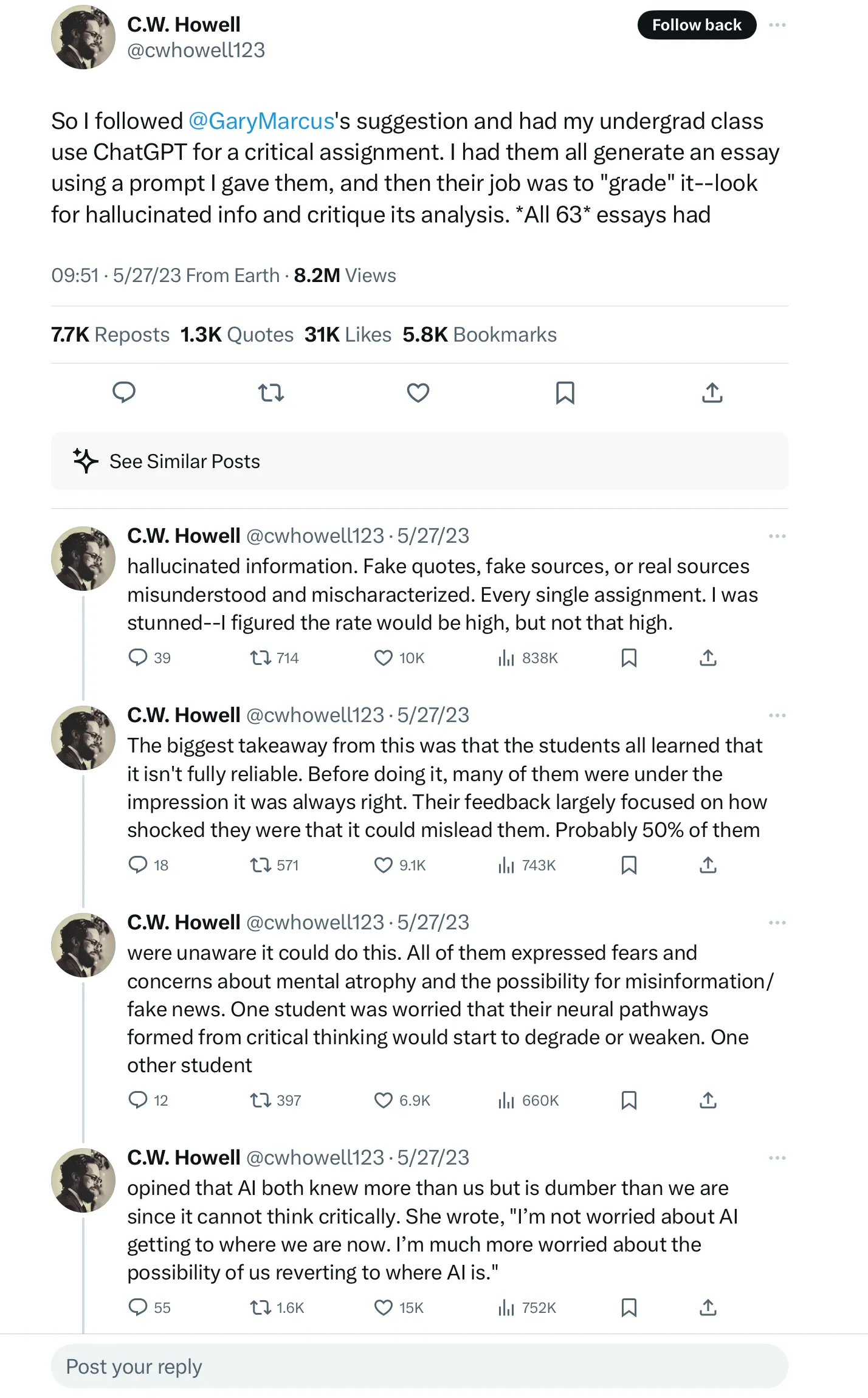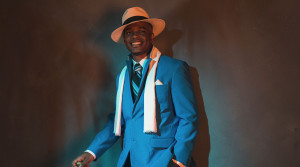This is the big story, as reported by New York Magazine. Cheating, however, is not new, but the scale of cheating using GenAI has become a threat to our human intelligence, future innovation and invention capabilities.
The article highlights that in January 2023, a survey of 1,000 college students found that nearly 90 percent of them had used OpenAI’s chatbot to help with homework assignments. On the surface, using ChatGPT for quick look-ups or summarizations is not an issue, at least from where I sit. However, when it goes way beyond that, when students use it to do all their assignments, it becomes a future existential threat to our future intelligence and humanity.
The primary example given in the article is a Columbia computer science student, “by his own admission, proceeded to use generative artificial intelligence to cheat on nearly every assignment,” and “I’d just dump the prompt into ChatGPT and hand in whatever it spat out.” Essentially, AI wrote 80 percent of every essay he turned in, he told the magazine.
Another student, a freshman at Wilfrid Laurier University in Ontario, says she used it for all her classes: “Indigenous studies, law, English,” etc. “My grades were amazing,” she said. “It changed my life. With ChatGPT, I can write an essay in two hours that normally takes 12.”
What is happening is the short-term instant gratification at the expense of critical thinking, the ability and capacity necessary for innovating, creating, and inventing our world. This is fundamental to the human condition’s ability to progress and its sophistication for self-preservation—to adapt and thrive in new or challenging environments. This is what it is to be human; if we lose that, we effectively will lose our humanity. Minimization of intellectual capacity means you lose it, and you degenerate into the abyss of abstraction, unwittingly erasing yourself and making you replaceable in the universe.
From January 2023, just two months after OpenAI launched ChatGPT, “Professors and teaching assistants increasingly found themselves staring at essays filled with clunky, robotic phrasing that, though grammatically flawless, didn’t sound quite like a college student—or even a human.” And increasingly, students from “large state schools, the Ivies, liberal-arts schools, universities abroad, professional schools, and community colleges were relying on AI to ease their way through every facet of their education.”
Generative-AI chatbots — ChatGPT, Google’s Gemini, Anthropic’s Claude, Microsoft’s Copilot, and others — can be helpful in their ability to take notes for students during class, devise their study guides and practice tests, summarize novels and textbooks, and brainstorm, outline, and draft their essays.
But with STEM for example, students are effectively not learning how to “do science,” they are using AI to automate their research and data analyses, dense coding and debugging assignments. “College is just how well I can use ChatGPT at this point,” a student in Utah recently captioned a video of herself copy-and-pasting a chapter from her Genocide and Mass Atrocity textbook into ChatGPT.
Cheating is nothing new. But as one student put it, now “the ceiling has been blown off.” Who could resist a tool that makes every assignment easier with seemingly no consequences?
But there are consequences. Big ones.
“Massive numbers of students are going to emerge from university with degrees, and into the workforce, who are essentially illiterate,” says Troy Jollimore, philosopher and Cal State Chico ethics professor. And Professor Brian Patrick Green, Applied Ethics at Santa Clara University, says, “We’re talking about an entire generation of learning perhaps significantly undermined here,” said Green. “It’s short-circuiting the learning process, and it’s happening fast.”
Students have to think hard and critically about the medium and long-term negative implications of ChatGPT dependency. Some students have already indicated that a dependency on ChatGPT and other social media platforms like TikTok, and the inability to get anything done without it, is causing them stress anxiety about their future.
Multiple studies published within the past year have found a direct link between AI dependency and deterioration in critical-thinking skills. A Microsoft and Carnegie Mellon University study found that a person’s confidence in generative AI correlates with reduced critical-thinking: “This is all especially unnerving if you add in the reality that AI is imperfect — it might rely on something that is factually inaccurate or just make something up entirely — with the ruinous effect social media has had on Gen Z’s ability to tell fact from fiction.”
It reminds me of the parable of the Thanksgiving Turkey, as told by best-selling author, NYU business professor, Nicholas Nassim Talib in his book, The Black Swan. It examines “the impact of the highly improbable” becoming probable because our outcomes depend on our choices.
The parable of the turkey is one where the turkey is kept in a warm coop in wintertime, with plenty of corn to eat, mingling with all the other turkeys. But there is one particular turkey, so willfully ignorant and gullible that he eats everything without thinking about why he’s being fed and treated so well. And can’t understand why the other turkeys are not indulging like he is—why they remain so cautious and skeptical about the treatment. Then came Thanksgiving!
“Consider a turkey that is fed every day. Every single feeding will firm up the bird’s belief that it is the general rule of life to be fed every day by friendly members of the human race looking out for its best interests. But on the afternoon of the Wednesday before Thanksgiving, something unexpected will happen to the turkey. It will incur a revision of belief.”
― Nassim Nicholas Taleb
The moral of the story is to be aware of what’s happening and think critically—don’t be like the gullible Thanksgiving Turkey buying into the improbability of such a wonderful situation. Taleb is warning us to be aware of the motives of others because there is always a motive, and you are the one ultimately responsible for your own self-preservation, prosperity or suffering. So, when it comes to AI, don’t set yourself up for being replaced.
For those of us paying attention and learning from a thousand years of history and contemporary evidence, one thing is clear: civilization’s progress depends more on the choices we make about technology than on the technology itself. How we use and integrate technology into our lives to enhance our human capacity, creativity, and ingenuity is critical to the type of outcomes we generate for ourselves.
Professor C. W. Howell gave his students the task of writing essays with ChatGPT — and found that 100% of them contained “hallucinations”.

While fact-checking for this article, our editor noticed that C.W. Howell did not exist on X and questioned the veracity of this screenshot. In a few minutes, she was able to confirm Mr. Howell's identity and found a comment he made on another website, where he explained that he had since deleted his X account and quit teaching shortly after this experiment.
He said the experiment was "... just something I came up with on the fly as my class was being undone by ChatGPT. I didn't have much hope though, and I actually quit teaching after that semester and have mostly given up on higher education. Felt like fleeing a burning building.”
This is a prime example of why human intelligence is paramount.
The so-called Flynn effect refers to the consistent rise in IQ scores from generation to generation, going back to at least the 1930s. However, that rise has slowed, and in some cases, has reversed, and “The greatest worry in these times of generative AI is not that it may compromise human creativity or intelligence,” Robert Sternberg, a psychology professor at Cornell University, told The Guardian, “but that it already has.”
Michael Johnson, an associate provost at Texas A&M University, says that “Adolescents benefit from structured adversity, whether it’s algebra or chores. They build self-esteem and a work ethic. It’s why the social psychologist Jonathan Haidt has argued for the importance of children learning to do hard things, something that technology is making infinitely easier to avoid.”
Eventually, no matter what, everyone will have to use their human intelligence, brains to get ahead, that’s how it has always worked in the history of Homo sapiens. The problem may be that the next generation of brains may be all mush! Incapable of any useful formation of basic ideas.
In the digital age, many are choosing wilful ignorance or taking the easy road, but the more challenging and critical thinking road is the one that forges knowledge, know-how and resilience. A superficial or cursory existence leads to mediocrity and failure, a life of making excuses and blaming others. No matter what, you have to put in the work; there is no way around it.
In the future, ChatGPT-dependent students will be sorted out by natural selection. Variations and traits will separate and replace those who have not authentically learned. The winners will be those who have done the work and have achieved, which can translate into authentic value. No machine would be able to replace these 21st-century creators and innovators. In the future, this group will grab a greater share of the wealth and prosperity, and the cheaters will be marginalized.
As Noam Chomsky, former MIT professor, public intellectual and the father of modern linguistics, says, ChatGPT tells you nothing that we already don’t know or can’t find with a little effort. And that it’s not intelligence, only amazing memory capacity, that gives the impression of intelligence.

 By
By 





